
 i_need_contribute
i_need_contribute

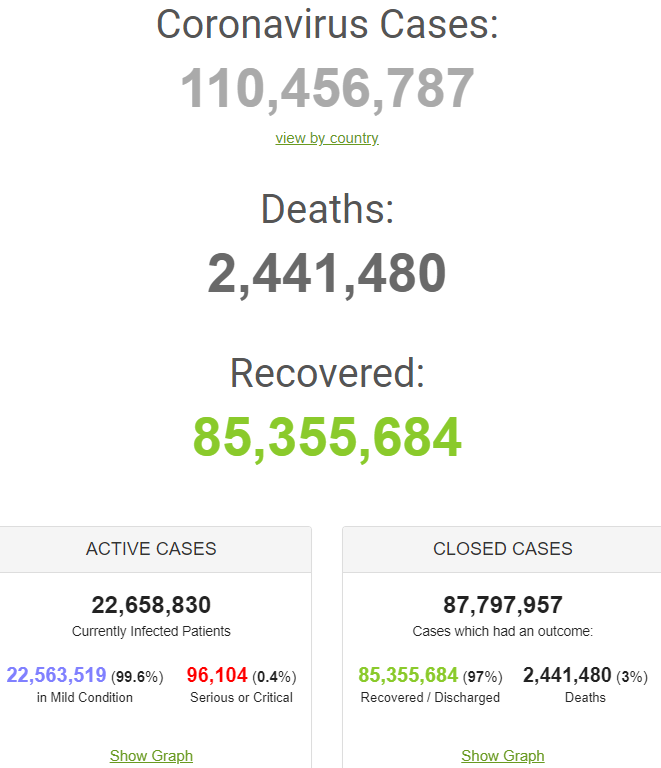
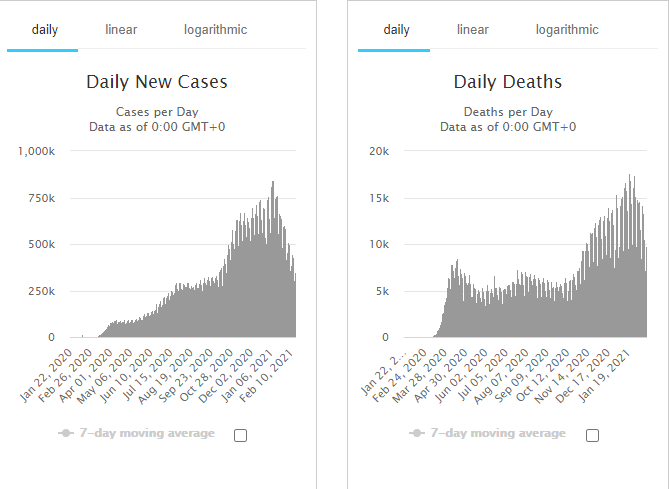
|
Country, |
Total |
New |
Total |
|
World |
110,418,822 |
+392,406 |
2,439,909 |
|
28,453,526 |
+71,640 |
502,544 |
|
|
10,949,546 |
+12,440 |
156,038 |
|
|
9,979,276 |
+57,295 |
242,178 |
|
|
4,112,151 |
+12,828 |
81,446 |
|
|
4,071,185 |
+12,718 |
118,933 |
|
|
3,514,147 |
+25,018 |
83,122 |
|
|
3,107,172 |
+10,829 |
66,316 |
|
|
2,751,657 |
+12,074 |
94,540 |
|
|
2,609,359 |
+7,325 |
27,738 |
|
|
2,362,364 |
+9,598 |
67,074 |
|
|
2,207,701 |
+5,103 |
58,134 |
|
|
2,039,124 |
+6,064 |
50,616 |
|
|
2,004,575 |
+8,683 |
175,986 |
|
|
1,605,372 |
+8,694 |
41,308 |
|
|
1,542,076 |
+8,042 |
59,184 |
|
|
1,496,439 |
+2,320 |
48,478 |
|
|
1,280,904 |
+4,286 |
24,689 |
|
|
1,252,137 |
+7,408 |
44,308 |
|
|
1,243,646 |
+9,687 |
33,788 |
|
|
1,112,439 |
+12,591 |
18,682 |
|
|
1,038,156 |
+3,361 |
15,017 |
|
|
834,182 |
+2,605 |
21,435 |
|
|
790,885 |
+2,324 |
15,649 |
|
|
784,314 |
+2,275 |
19,659 |
|
|
768,785 |
+2,815 |
19,588 |
|
|
741,205 |
+1,717 |
21,750 |
|
|
738,629 |
+4,054 |
5,473 |
|
|
653,557 |
+3,575 |
13,204 |
|
|
565,989 |
+1,165 |
12,436 |
|
|
553,424 |
+1,184 |
11,577 |
|
|
541,877 |
+443 |
8,314 |
|
|
479,579 |
+508 |
8,517 |
|
|
437,874 |
+1,735 |
8,290 |
|
|
426,487 |
+2,467 |
4,277 |
|
|
419,015 |
+1,250 |
7,102 |
|
|
391,170 |
+1,548 |
13,931 |
|
|
373,702 |
+334 |
6,445 |
|
|
358,583 |
+3,452 |
1,055 |
|
|
355,106 |
+2,887 |
4,503 |
|
|
346,080 |
+2,479 |
4,152 |
|
|
333,755 |
+504 |
5,672 |
|
|
282,864 |
+3,168 |
6,168 |
|
|
273,070 |
+125 |
2,055 |
|
|
272,273 |
+1,352 |
1,876 |
|
|
272,163 |
+2,998 |
1,005 |
|
|
268,219 |
+146 |
15,394 |
|
|
266,948 |
+486 |
3,390 |
|
|
238,501 |
+502 |
5,375 |
|
|
237,706 |
+562 |
11,274 |
|
|
233,342 |
+1,246 |
9,744 |
|
|
232,491 |
+154 |
3,187 |
|
|
231,737 |
+642 |
2,990 |
|
|
225,116 |
+787 |
7,651 |
|
|
211,751 |
+638 |
4,036 |
|
|
205,597 |
+414 |
2,316 |
|
|
204,055 |
+796 |
2,540 |
|
|
200,888 |
+434 |
2,745 |
|
|
191,828 |
+383 |
3,118 |
|
|
181,606 |
+1,097 |
3,745 |
|
|
180,505 |
+1,017 |
1,019 |
|
|
175,677 |
+618 |
10,150 |
|
|
174,659 |
+754 |
6,194 |
|
|
172,815 |
+1,301 |
3,697 |
|
|
170,527 |
+1,040 |
1,948 |
|
|
169,597 |
+206 |
3,155 |
|
|
168,880 |
+777 |
6,164 |
|
|
161,727 |
+744 |
3,913 |
|
|
158,591 |
+453 |
256 |
|
|
149,369 |
+869 |
1,787 |
|
|
149,308 |
+818 |
2,237 |
|
|
147,253 |
+1,037 |
2,991 |
|
|
141,690 |
+31 |
3,192 |
|
|
138,206 |
+277 |
1,549 |
|
|
134,319 |
+392 |
1,297 |
|
|
128,348 |
+312 |
2,056 |
|
|
126,781 |
+368 |
4,949 |
|
|
115,057 |
+696 |
410 |
|
|
111,247 |
+178 |
2,947 |
|
|
103,332 |
+144 |
1,801 |
|
|
97,803 |
+347 |
3,010 |
|
|
95,726 |
+1,075 |
1,600 |
|
|
89,795 |
+7 |
4,636 |
|
|
85,619 |
+55 |
1,446 |
|
|
84,946 |
+621 |
1,538 |
|
|
79,497 |
+36 |
622 |
|
|
78,643 |
+946 |
1,508 |
|
|
78,271 |
+1,225 |
565 |
|
|
77,906 |
+722 |
422 |
|
|
71,677 |
+854 |
983 |
|
|
70,174 |
+404 |
916 |
|
|
67,498 |
+358 |
607 |
|
|
59,821 |
+11 |
29 |
|
|
55,557 |
+17 |
2,430 |
|
|
54,300 |
+811 |
510 |
|
|
53,329 |
+267 |
616 |
|
|
52,629 |
+829 |
561 |
|
|
51,595 |
+548 |
723 |
|
|
50,208 |
+483 |
553 |
|
|
40,765 |
+824 |
277 |
|
|
40,102 |
+39 |
331 |
|
|
36,440 |
+74 |
394 |
|
|
35,423 |
+108 |
1,418 |
|
|
32,828 |
+121 |
227 |
|
|
8,832 |
+12 |
168 |
|
|
7,513 |
+52 |
69 |
|
|
2,329 |
+18 |
35 |
Retrieved from: https://www.worldometers.info/coronavirus/
From CNN’s Sarah Dean and Meera Senthilingam in London

Patients wait after receiving their Covid-19 jabs at a vaccination centre at Salisbury Cathedral on February 11, in Salisbury, England. Dan Kitwood/Getty Images
Covid-19 infections in England have fallen by more than two-thirds in recent weeks, initial findings from a survey on community prevalence show.
The interim findings from the ninth report of REACT-1, a study into Covid-19 infections in England, were released Thursday by Imperial College London.
More than 85,400 volunteers were tested with throat and nose swabs in England between February 4 and 13 to examine the levels of infection in the general population.
The findings show national prevalence fell by two thirds — from 1.57% to 0.51%, or 51 per 10,000 infected. This is a significant decline in infections compared to the last report from January 6 to 22. England entered its third national lockdown of the pandemic on January. 6.
“These encouraging results show that lockdown measures are effectively bringing infections down. It’s reassuring that the reduction in numbers of infections occurred in all ages and in most regions across the country,” Paul Elliott, director of the program at Imperial, said in a statement.
The decline in prevalence was larger in some regions, in particular in London where it fell from 2.83% to 0.54% since the last report.
“In London, South East and West Midlands, prevalence fell by around 80%, although declines were smaller in the northern regions,” the Imperial report says.
Prevalence fell substantially across all age groups with highest prevalence among 18- to 24-year-olds at 0.89% and those between the ages of 5 and 12 at 0.86%, the report adds. The report concludes that although there is a " strong decline" in prevalence of coronavirus in England among the general population five to six weeks into lockdown, it still remains high — "at levels similar to those observed in late September 2020."
There are also still more people hospitalized with Covid-19 than at the peak of the first wave in April 2020.
The UK began its mass vaccination campaign in December, offering nearly all people over 70 a vaccine during January and February. It has now given more than 15 million people a first dose.
“The fall in prevalence was similar among those aged 65 years and over compared with other age groups, suggesting that if vaccines are effective at reducing transmission as well as disease, this effect is not yet a major driver of prevalence trends. Therefore, the observed falls described here are most likely due to reduced social interactions during lockdown,” the report reads.
“We do not yet know whether being vaccinated stops someone from passing the virus on to others,” England’s Department of Health added.
However, on Tuesday the UK Office for National Statistics reported almost 41% of over-80s in England tested positive for antibodies "most likely due to the high vaccination rate in this group.”
From CNN’s James Frater in London
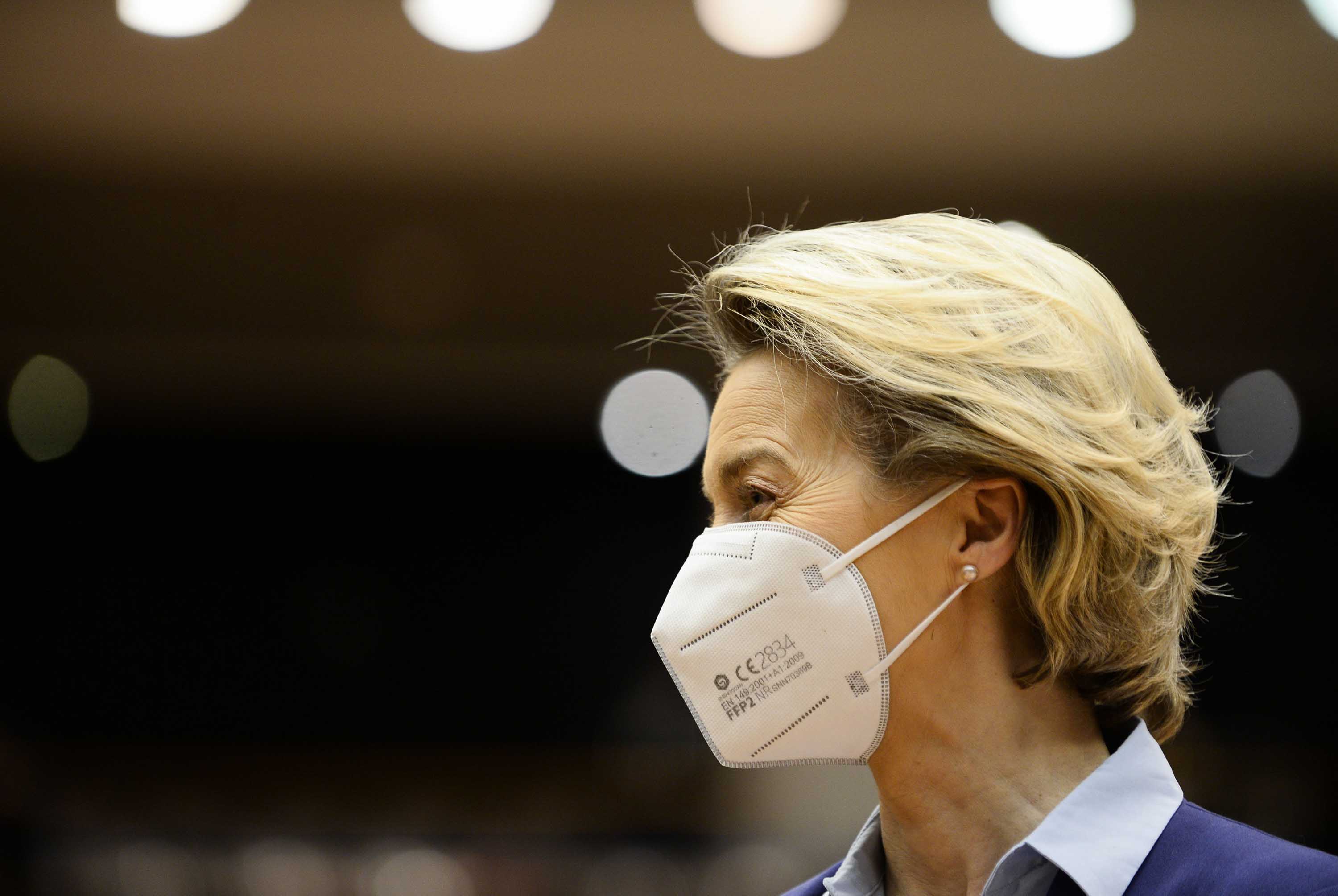
European Commission President Ursula Von Der Leyen looks on as she arrives at the European Parliament to explain the European Union's vaccine strategy, in Brussels, Belgium, on February 10. Johanna Geron/AFP/Getty Images
The European Union has announced a plan called the “HERA Incubator” to combat the increased threat from coronavirus variants.
In a statement the European Commission said the HERA Incubator will “bring together researchers, biotech companies, manufacturers, regulators and public authorities to monitor variants, exchange data and cooperate on adapting vaccines.”
The core function of the HERA Incubator will be to “boost preparedness, develop vaccines for the variants and increase industrial production.” It will receive €75 million in funding to develop specialized tests for new variants, and to support genomic sequencing across the EU.
In addition, a clinical trial network which brings together 16 EU member states and five other countries including Switzerland and Israel will be created to exchange data and findings from trials.
The rapid spread of Covid-19 variants has raised concerns about the effectiveness of current approved vaccines against these mutations. With the emergence of the UK and South Africa variants that have been linked to a faster spread of infection, several vaccine makers and independent researchers ran additional tests to find out whether their shots are still efficient. For example, early results suggested the Pfizer-BioNTech and Moderna vaccines protect against the new variants, but are slightly less effective.
But a variant of Covid-19 that emerged in South Africa forced the country to pivot from using AstraZeneca vaccine to the Johnson & Johnson shot. The decision was made after preliminary trial data showed AstraZeneca’s shot offered minimal protection against mild to moderate illness caused by that variant.
A potential issue that may arise as the world tries to end the pandemic is having to go through months of approval processes for adapted vaccines, in attempts to catch up with emerging variants that could cause more severe illness.
The European Commission has proposed changing current regulations to allow “the approval of an adapted vaccine with a smaller set of additional data” and is considering a new category of emergency authorization of vaccines at EU level.
“New variants of the virus are emerging fast and we must adapt our response even faster,” President of the European Commission Ursula von der Leyen said, adding that the HERA Incubator would pull “all available resources to enable us to respond to this challenge.”
The HERA Incubator will also serve as a blueprint for the EU's long-term preparedness for health emergencies.
European leaders will meet on February 25, when the Commission hopes they will endorse and mandate the HERA Incubator.
By CNN’s Stephanie Halasz
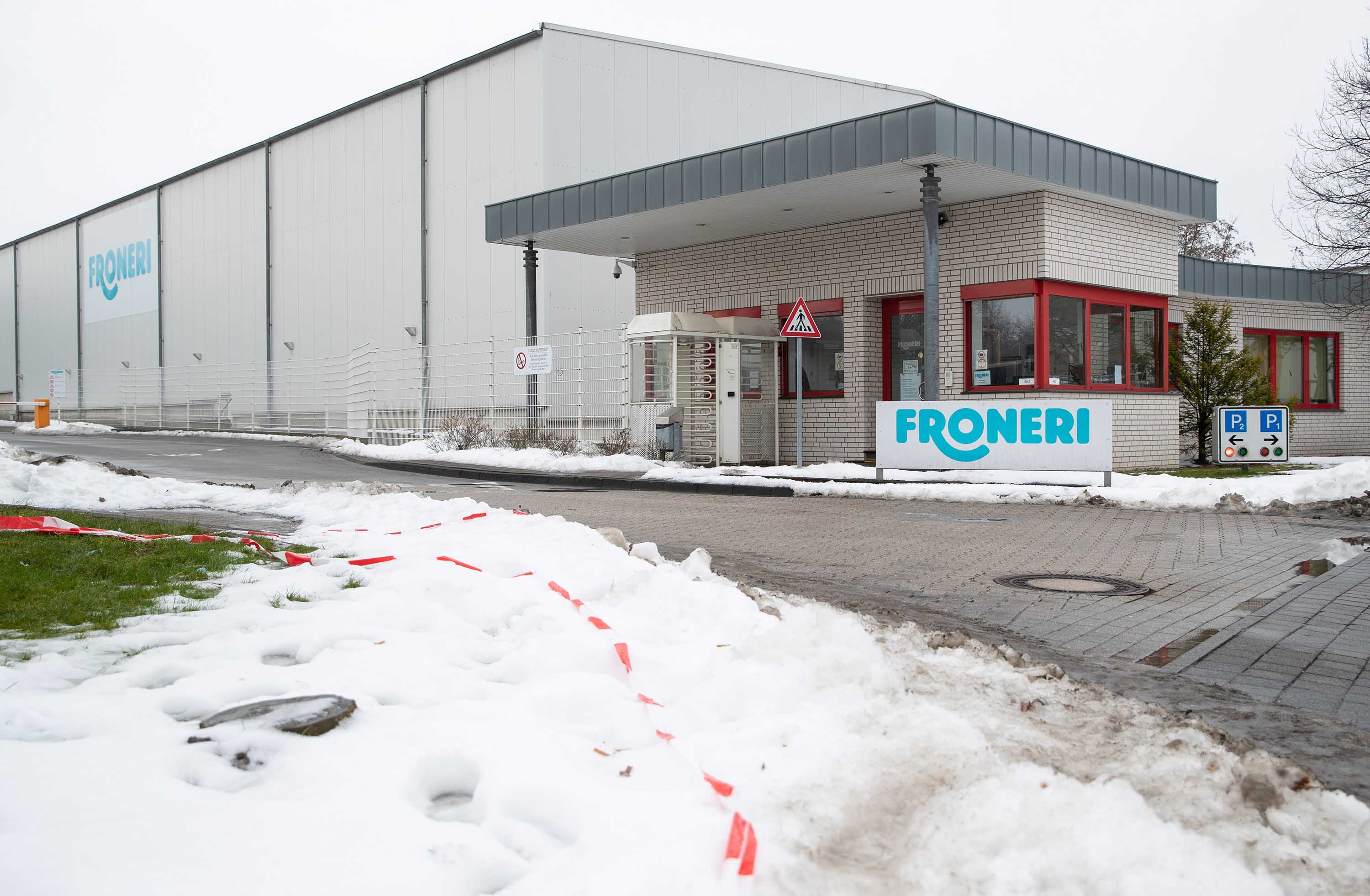
The Froneri factory is pictured on February 16 in Osnabrück, Germany. Friso Gentsch/picture alliance/Getty Images
An ice cream factory in northern Germany has been hit by an outbreak of the coronavirus, the manufacturer said in a press release Wednesday.
Froneri said it is investigating how the virus made it into its plant in Osnabrueck.
So far, 670 staffers -- all those who had access to the plant since January 25 -- have been tested, with 210 results returning positive. Some of those cases are the UK coronavirus variant, Froneri said, without specifying a number.
The plant will stay shut till February 26, and all plant workers are to be tested one more time.
Froneri added that there have not been physical visits to its headquarters in the UK in months, and therefore, the outbreak has not spread to the facility there.
From CNN's Sharon Braithwaite
The world's first Covid-19 human challenge study will begin within a month in the UK, the country's Department for Business, Energy and Industrial Strategy (BEIS) said Wednesday in a statement.
During this trial, up to 90 volunteers aged 18-30 years will be exposed to Covid-19 in a safe and controlled environment to increase understanding of how the virus affects people, the ministerial department said, adding that the study will play a "key role in developing effective Covid-19 vaccines and treatments".
What is a challenge trial? In regular Phase 3 Covid-19 vaccine trials tens of thousands of volunteers are given an experimental vaccine and then released to live their everyday lives; researchers assume that a certain percentage of them will be exposed to the virus naturally.
In a challenge trial, by contrast, participants are deliberately dosed with virus.
Proponents of challenge trials say that they are more efficient, requiring far fewer volunteers because researchers know for certain that everyone will be exposed to the virus, and that they can deliver scientific data more quickly.
Critics worry about exposing people to a virus for which there is no fail-safe treatment, and say that the young, healthy volunteers are not representative of the wider population.
BEIS said the version of the virus used would be the one in circulation since March 2020 -- rather than any new strains -- emphasizing that it "has been shown to be of low risk in young healthy adults."
After the initial trial, vaccine candidates which had been proved safe in clinical trials could be given to small numbers of volunteers, the department said.
Earlier this week the UK hit its target of offering a first dose of vaccine to 15 million people by mid-February.
Retrieved from: https://edition.cnn.com/world/live-news/coronavirus-pandemic-vaccine-updates-02-18-21/index.html
By Ed Augustin and Natalie Kitroeff
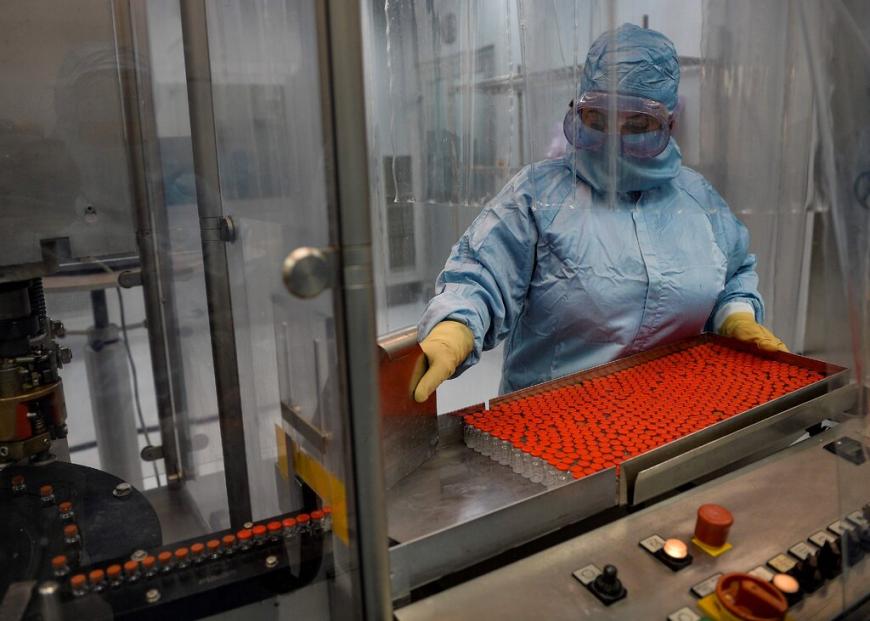
Mayelin Mejias working at the Finlay Vaccine Institute in Havana last month. The first of four vaccines being developed in Cuba will soon enter a final phase of testing.Credit...Yamil Lage/Agence France-Presse — Getty Images
The Cuban government says it is on the brink of an extraordinary scientific achievement: the mass production of a coronavirus vaccine invented on the island.
One of the four vaccines developed by Cuban scientists will enter a final phase of testing next month, a crucial step toward regulatory approval that, if successful, could put the island on the path to inoculate its entire population and begin exports by year’s end.
If the vaccine proves safe and effective, it would represent a significant political victory for the Cuban government — and a chance to rescue the nation from economic ruin. For a country that has for decades touted its sophisticated health care system as evidence of the benefits of socialism, the vaccine also offers a unique public relations opportunity.
The vaccine heading for a final phase of trials is called Sovereign 2, in a nod to the pride the island takes in its autonomy, despite decades of hostility from its neighbor to the north. Already, Cuba is floating the idea of enticing tourists to its shores with the irresistible cocktail of sun, sand and a shot of Sovereign 2.
Vicente Vérez, one of the scientists leading the team that developed the vaccine, has said that the island could offer vaccinations to all foreigners who travel there.
Cuban scientists say the government will probably give away some doses to poor countries, in keeping with its longstanding practice of strengthening international relations by donating medicine and sending doctors to address public health crises abroad.
Cuba began to pour money into biotech in the 1980s, as part of Fidel Castro’s drive to make the nation self-sufficient in the face of a U.S. embargo that made it difficult to obtain drugs produced abroad. That investment gave rise to dozens of medical research institutions and a surplus of doctors who can travel on those medical missions.
In 2019, the leasing of doctors, nurses and technicians brought in $5.4 billion, twice as much as tourism, a major driver of the economy.
As for the biotech sector, Cuba makes eight of the 12 vaccines administered to children on the island and exports vaccines to more than 30 countries.
The plan to open Covid-19 vaccination to tourists appears to some to be a risky and shrewdly capitalist gambit to attract visitors, and with them the hard currency the island desperately needs. The combination of the pandemic and sanctions have created the worst economic crisis the country has experienced since the fall of the Soviet Union in the 1990s, experts say.
Cuban scientists, however, insist the goal is to spread health. Any profit, they say, is merely a side effect.
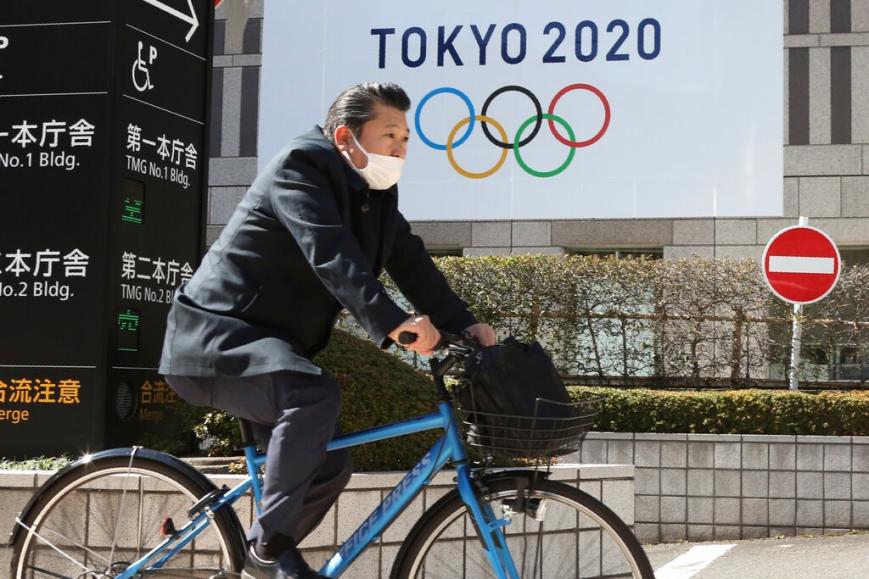
Japan’s late start on vaccines has raised questions about whether it will be ready to host the Olympics, which are scheduled to begin in Tokyo this July after a one-year delay. Credit...Koji Sasahara/Associated Press
TOKYO — Japan began its national coronavirus vaccination program on Wednesday, starting with the first of 40,000 medical workers and planning to reach the general population by the summer.
The comparatively late start has raised questions at home and abroad about whether the country will be ready to host the Olympics, which are scheduled to begin in Tokyo this July after the pandemic forced a one-year delay.
Japan has managed to keep coronavirus infection levels relatively low and, so far, has recorded around 7,200 deaths. But the authorities declared a one-month state of emergency in early January, after daily case counts reached nearly 8,000. They have since extended it until at least the beginning of March, partly in response to more contagious coronavirus variants.
The vaccine rollout has been slower than in many other developed countries in part because the authorities requested that Pfizer run separate medical trials in Japan. That reflected some public ambivalence toward vaccinations, a general sense of caution that most recently surfaced after media reports about rare side effects related to vaccines for HPV.
Speaking to the news media on Tuesday, Taro Kono, the minister in charge of the rollout, emphasized that it was important to “show the Japanese people that we have done everything possible to prove the efficacy and safety of the vaccine.”
While that slowed the program’s start, he said, “We think it will be more efficient.”
Major obstacles to a rapid rollout remain. Japan relies on other countries for its entire vaccine supply and is still working to approve the vaccines from AstraZeneca and Moderna. It is also short of the special syringes that would allow its doctors to extract an extra, sixth dose from each vial supplied by Pfizer.
In his remarks on Tuesday, Mr. Kono said the vaccination program was not linked to the Games.
Speaking on Wednesday, the governor of Shimane Prefecture, which has recorded only 280 cases, threatened to pull it out of activities around the Olympic torch relay for fear of spreading infection.
Retrieved from: https://www.nytimes.com/live/2021/02/17/world/covid-19-coronavirus/japan-finally-begins-vaccinations-with-the-olympics-looming
Here are the key developments from the last few hours:
· US agents seized 10m fake N95 masks. US federal agents have seized more than 10 million fake 3M brand N95 masks in recent weeks, the result of an ongoing investigation into counterfeits sold in at least five states to hospitals, medical facilities and government agencies.
· Hong Kong has fast-tracked China’s Sinovac vaccine approval. Hong Kong’s government on Thursday approved the Chinese-made Sinovac coronavirus vaccine for emergency use after a panel of experts fast-tracked its recommendation despite the drug’s comparatively low efficacy.
· India will make Covid molecular tests mandatory for people arriving directly or indirectly from the United Kingdom, South Africa and Brazil in a bid to contain the spread of more infectious virus variants found in those countries.
· The United Nations on Wednesday led calls for a coordinated global effort to vaccinate against Covid-19, warning that gaping inequities in initial efforts put the whole planet at risk. Secretary-General Antonio Guterres voiced alarm that just 10 nations have administered 75 percent of doses so far - and 130 countries have received no doses.
· Demand for UK nursing degrees has risen by a third during the pandemic. The Covid pandemic has inspired a new generation of students to become nurses, with a third more applying to study the subject at university than last year, though professional leaders say the rise only brings numbers back to the level of five years ago.
· Australia will begin its first coronavirus vaccinations from Monday in about 240 aged care homes across more than 190 locations around the country. The rollout will begin with the Pfizer/BioNTech vaccine, with the AstraZeneca/Oxford vaccine due to join the rollout from early March.
· Covid infections in England fall by two-thirds but spreading fastest among young, a study suggests. The React 1 study from Imperial College London points to the third national lockdown having significantly curbed the spread of the coronavirus despite the emergence of new variants.
· New Zealand’s birthrate dropped to its lowest ever level in 2020, well below the population replacement rate of 2.1. According to Statistics New Zealand, the country’s total fertility rate dropped to 1.61 births per woman of child-bearing age (15–49 years), the latest fall in a decade-old trend.Most babies registered in 2020 were conceived before New Zealand moved to Covid-19 lockdown on 25 March last year, said Hamish Slack at Statistics NZ.
· Devastating winter storms sweeping the US have injected confusion and frustration into the US Covid-19 vaccination drive, snarling deliveries and forcing the cancellation of thousands of shots around the country.Across a large swath of the US, including deep south states such as Georgia and Alabama, the snowy, slippery weather either led to the closing of vaccination sites outright or held up the necessary shipments, with delays expected to continue for days.
· BioNTech says it will provide vaccines to Taiwan, talks ongoing. Germany’s BioNTech SE plans to provide Covid vaccine to Taiwan, the company said, after the island complained the firm in December pulled out of a deal to buy 5 million doses at the last minute, possibly due to Chinese pressure.